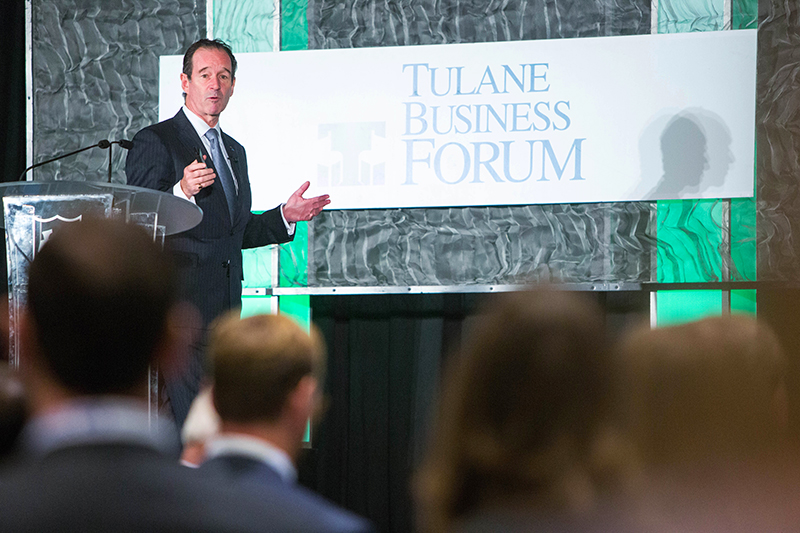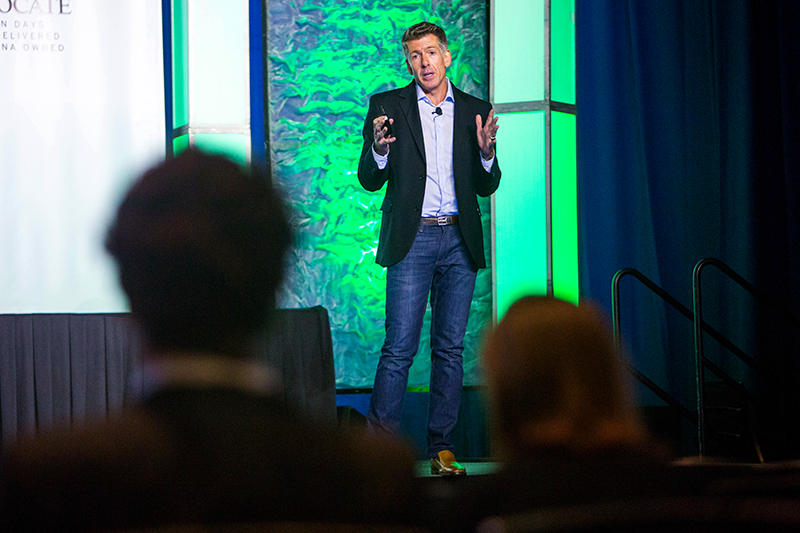Big data, big opportunities

What does your credit rating say about your potential health risks? As it turns out, quite a lot.
“The financial status and retail purchasing behaviors of our members turn out to be a very strong predictor of how they’re going to behave,” said Dr. I. Steven Udvarhelyi, president and CEO of Blue Cross and Blue Shield of Louisiana. “They’re going to take their retail purchasing behavior and apply it to health care, and we can predict their health events using that.”
Udvarhelyi delivered the luncheon keynote address at the 38th annual Tulane Business Forum on Friday (Sept. 22) at the Ernest N. Morial Convention Center. With the theme “Big Ideas, Big Data,” this year’s forum focused on organizations that are using data in bold and innovative ways.
Udvarhelyi said Blue Cross is increasingly shifting its emphasis to behavior change, using data-driven insights — like the correlation between financial health and physical health — to help improve the healthcare decisions of its 1.5 million members in Louisiana. For example, Udvarhelyi said Blue Cross can reliably predict the likelihood that a member will have kidney disease using technologies similar to those used by Google when it predicts user search queries. Armed with that information, the company can then incentivize both the member and the physician to seek early treatment.
“We need to pay for value and outcomes rather than just the number of things that are done,” Udvarhelyi said. “And we need to enable patients, physicians and other clinicians with actionable information.”

Capital One is another company using data to fundamentally transform itself. Morning keynote speaker Michael B. Eason, Capital One's senior vice president of commercial technology, said the smart phone has in just 10 years changed the way many companies do business — and put a lot of companies out of business.
“If you look at the major disrupters in all these different industries — be it retail, music, entertainment, media, lodging — the thing that you see is they’re software companies,” Eason said. “So what we’re really trying to do is position Capital One to be the next big disrupter in banking.”
Eason said Capital One’s transformation began five years ago with a bold commitment to digital banking. Prior to that, most of the company’s software engineering was outsourced and outside vendors were largely responsible for designing the customer experience. Since 2012, Capital One has moved most of its software engineering in-house and made empathy-driven design the centerpiece of its customer experience.
“This doesn’t mean going out and asking your customer what they want,” Eason explained. “It means embed yourself in their process. Understand the things that they’re feeling, what they’re trying to solve and the process that they’re using. [It means] creating constant feeback loops, so once you put something in market, how quickly can you tell if people are getting a lift from it and do you even have the measurements to tell if something is actually creating value.”
In addition to Udvarhelyi and Eason, the forum included presentations from confirmation.com President Brian Fox, University Medical Center CEO Bill Masterton and KPMG Managing Director Garth Roark as well as a panel discussion on doing business in Cuba featuring Phelps Dunbar partner Christopher K. Ralston, World Trade Center of New Orleans CEO Caitlin Cain, Port of New Orleans President and CEO Brandy D. Christian and Hurley & Cot partner Jose R. Cot.
“Data analytics is radically altering how businesses operate and is, without question, an area of rapidly increasing student interest,” said Freeman School Dean Ira Solomon. “I thought this year’s speakers did an outstanding job explaining how the intelligent use of data is transforming their jobs and driving decision making within their organizations.”